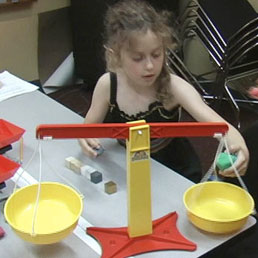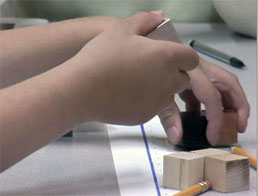About The Inquiry Project

What is the Inquiry Project?
The Inquiry Project is a partnership between teachers, TERC and Tufts University funded by the National Science Foundation in Washington DC. This project builds an understanding of science in grades 3–5 that lays a foundation for students’ later understanding of matter in terms of molecules and atoms. The focus of The Inquiry Project is on material, weight, volume, density and related ideas that we know are important and challenging for today’s students. Unique characteristics of this work are the integration of mathematics into the science content and the focus on inquiry through investigation.
The Inquiry Project brings research, curriculum, assessment, and professional development together in one coherent system. Each of these components is vital to developing an understanding of how to best prepare learners for this challenging learning progression.
The Inquiry Project is Asking:
- What do young children think about matter, materials kinds, and their properties?
- What understandings at the macroscopic level are pivotal for children to move towards a microscopic understanding of matter?
- What kinds of mathematical knowledge and representations are important to their understanding of matter?
- What kinds of metaconceptual knowledge are needed to support inquiry and theory building about matter?
What understanding do students develop and why is this important?
Inquiry is central to science learning. As described in the National Science Education Standards (NRC, 1996), a classroom having the essential features of inquiry is one in which learners:
- engage in scientifically oriented questions
- give priority to evidence in responding to questions
- formulate explanations from evidence
- connect explanations to established scientific knowledge
- justify and communicate explanations.
Measurement of matter

Many middle school students can calculate density as the ratio of mass to volume, but lack a deeper intuitive sense that density is related to number of particles within a specific volume and the mass of those particles. In The Inquiry Project, students learn to measure weight and volume using a variety of methods and use their measurements as evidence to support explanations. They begin to understand that all matter (in solid, liquid, or gaseous form) has weight and volume. With a firm grasp of the measurement of weight and volume, students are able to build mental models of matter and density that will help them understand the particulate nature of matter later on.
Conservation and Transformation
The Inquiry Project helps students deepen their understanding of matter and materials through investigations of what changes and what stays the same when matter changes state, is reshaped, divided, heated, and mixed. In these investigations students need to isolate variables that are important to their investigations and control their experimentation to measure these variables. They use their measurements and their emerging models of matter to understand that some quantities, such as the total mass of a system, do not change.
Scale
Students build an intuitive sense of scale of space (volume), weight, and density that will later assist them in developing a particulate model of matter. Moving from macroscopic to microscopic thinking requires the ability to construct mental models about things and processes we cannot observe. Students who gain a strong understanding of quantities of volume, weight, and density through observation, measurement, and modeling are poised to understand quantities and phenomena at a scale that they cannot observe.
About TERC
TERC is a nonprofit made up of teams of math and science education and research experts dedicated to innovation and creative problem solving. At the frontier of theory and practice, TERC’s work encompasses research, content and curriculum development, technology innovation, professional development, and program evaluation. TERC has a passion for social justice and strives to create level playing fields for all learners, reaching more than three million students every year. To learn more, please visit www.terc.edu.
The Inquiry Project is based upon work supported by the National Science Foundation under Grant No. #0628245. Any opinions, findings, and conclusions or recommendations expressed in this material are those of the author(s) and do not necessarily reflect the views of the National Science Foundation.



